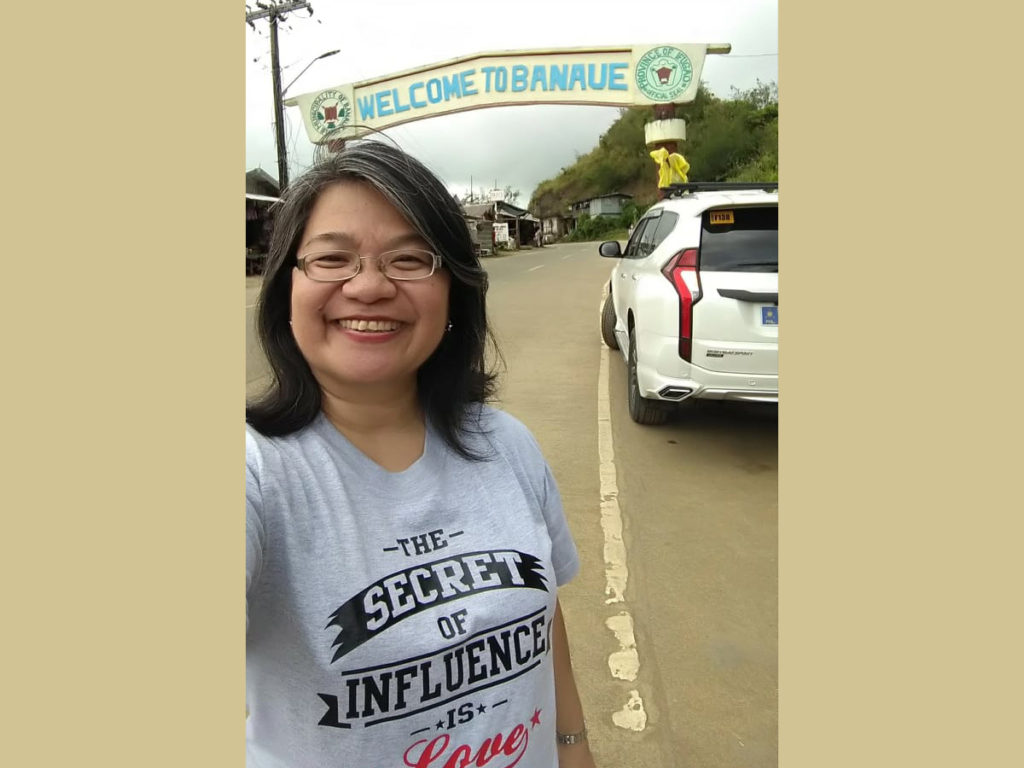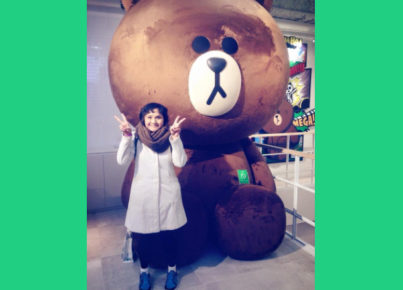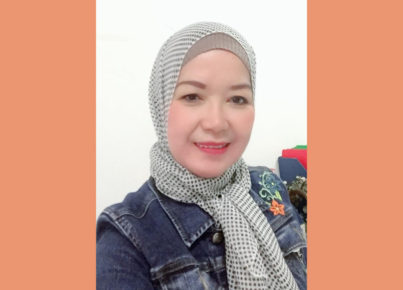“Spring During Monsoon Season”
Natalie C. Victorino
Financial Analyst
Philippines
At the time of this Web Project preparation, the helm of the government of the United States of America, to which the economies of most countries including the South East Asia’s are anchored, is forthcoming. By February 2021, at the TYCA Web Project 2020’s publication, actions by world’s governments would be more pronounced. At the same time, the vaccine for the covid-19 would be globally distributed which is hoped to be an important tool to stop the pandemic.
But what is the significance of both to a common man in any part of the world who is cares only for daily survival because not even his basic needs of food and shelter are met? As alumna Christine muses, gadgets and basic digital skills on connectivity are musts for continuing education or livelihood means. Equally critical is the basic need for safety when one is helpless from the effects of natural disasters due to negative externalities such as deforestation and not enforcing proper waste management. Thus, provisioning of infrastructure and bringing down the policies to the level of a common man is what would matter most at the adjustment period leading to the post-pandemic era.
We learned from classical economist Maslow the hierarchy of human needs. As the more basic psychological and survival needs are met, humans ache for higher. The classical hierarchy is now appended by digital-related needs such as battery and wifi as candidly suggested by Dr. Yoshinori Fujikawa during the 16thASJA- ASCOJA-PHILFEJA Symposium with the theme ASEAN- Japan Relations Caught on FIRe (Fourth Industrial Revolution), successfully held incidentally during the onslaught of the covid-19 last February, and thus by far, one of the last if not the last ASCOJA event during the current pandemic.
During the pandemic, in our country for example, as mentioned by alumnus Bertrand there are many who nurtured their gift of home gardening, which showed that even higher human need could be this simple. Of course, we can imagine how costly some garden plants in view of their rarity, which enhanced domestic economic mobility aka potted flowers and plant business.
Addressing constraints in social distancing and handling of money, online selling and digital payment thru use of mobile app is rapidly utilized more than ever. A simple folk may not have heard of Fintech (Financial technology), but resorted to nonetheless regardless of security reasons because of need to maintain isolation. I, for one in the midst of financial sector, had fintech phobia but now, I hardly care, let the financial regulatory bodies take care of it. Behaviour such as mine made winning sectors such as the Information Technology and Business Process Management, digital payment platform and other services such as delivery services connected thru mobile apps thrived during this pandemic. One Philippine mobile wallet registered 700% year-on-year increase in transaction volume and still another, which targeted unbanked Filipinos, with more than 2 million downloads. Government-both national and local levels- took the leap of implementing its social amelioration program to individuals and Micro and Small and Medium Enterprises (MSMEs) thru digital platforms.
Notwithstanding privacy safety concerns, the pandemic hastens the digital technology as the driver of productivity. Asian Development Bank Institute Dean Tetsushi Sonobe proposes global agreement on privacy, adequate regulation and governance of digital economies, legislation and taxation policies in support of digital economy.
The economic hardships brought about by the pandemic is just the Philippines’ share in the pervasive global suffering. At the domestic front, from beginning of 2020 in January, 3 provinces south of Manila were besieged by the eruption, a big one occurred almost 100 years ago, of the world’s smallest volcano, Taal. The eruption lasted for only for 10 days but affected area the size of Ota City in Tokyo suffered more than US$100 million damage to crops, losses to fisheries, coffee products, pineapple plantations, rice crops and corn, not including losses from tourism and air flight cancelation. As if a sign to prepare for the demand for facial masks, due to the volcano’s ashes which reached my province (passed thru Manila) and beyond it almost 150 kilometers north from Taal, the price of N95 masks jacked up to 8 times. Then covid-19 pandemic was declared and compounding it were the wreak havoc by succeeding typhoons and massive floodings which submerged the rice and corn-producing regions in our country. In spite of the last 10 years’ of massive flooding experience and thus, this calamity seemed no longer a natural disaster but a man-made one with the want of infrastructures and policies.
In view of its geographical location being in the Pacific Ring of Fire and also the typhoon belt in the Pacific, the Philippines is expectedly prone to earthquakes and volcanic eruptions and typhoon. This is the unique similarity between Japan and the Philippines, among the ASEAN countries which is also a very important area of cooperation and collaboration to improve and strengthen our country’s climate resiliency disaster response. Analytics in agricultural statistics and development planning, research on labour, health, and the environment are very much within the realm of the future career vision of our TYCA alumni.
With hard data from these natural disasters, digital transactions, healthcare provisioning, interesting results may be expected from ensuing empirical studies. Much relevant therefore are disciplines on Urban economics, R-programming and data analysis now undertaken by alumnus Matti. On the other hand, the use of digital technology thru the Open Map data from Taal eruption is one positive result to assist in the planning and reconstruction of areas damaged by the volcano eruption.
From the recent Philippine-Japan Business Investment Virtual Forum this December, one of the significant presentation is the resiliency of the global value chain (GVC). In the rebuilding of the economy, it is imperative that a revisit of the GVC in the region be made. For this, the empirical studies are essential and crucial to identify and strengthen new areas of cooperation between and among Japan, ASEAN and the Philippines. With the forthcoming graduates from the k-to 12 program, the batch of our TYCA alumni, which further elevates the capacity of Filipino labor force, not only big businesses’ but also MSMEs’ business activities should be able to accordingly gain the capacity to absorb and mobilize this wealth of human resource. I recall during the mid-2000 when we met a Filipino agriculturist who was training Remote Sensing in Nihonggo Program. We found out that he does not know Nihonggo and yet he understood and closely worked with sensei in the laboratory. Addressing the climate related disasters, which has bearing on agricultural efficiency at the same time addressing the dangers of soil erosion, our country should facilitate aerospace technology collaboration.
Rebuilding our global economy requires strong value-chain internally and globally. We equally share this earth. With world trade, we share its natural resources to address varied human needs. For example, in support of the need for internet speed and as the way of life are more and more supported by smart devices, infrastructures such as fiber optic cables and cell tower, the Philippines should also catch up with nanotechnology and other new technologies.
The aspiration that No one should be left behind, even prior to the coining of the term Sustainable Development Goal to which it is associated, has been emphasized in all volumes of TYCA and its predecessor Toshiba Youth Conference (TYC). We are confronted with the sad reality that among the best and the brightest, who without mindfulness of being humane and serving for the common good, can exploit the others, and thus others will be left behind. There is indeed a very thin line between the good and the bad.
Now in the universities, I found the difference between then, from the alumni’s writings and other activities ie Social Grant TYCA era, and now in that they are now more definite in their career vision and as I reflect on their new writings, I feel from them the maturity and stability. Also, there is consistency of ownership of advocacy. I believe the pandemic experience of fear and uncertainty of the future mostly contributed to discovering themselves which led them to recognizing and being resolved with the essentials and what matters most.
An opportune time for tabula rasa, the term I am introduced to by alumna Vien, which we harmonize with the realities in and of the world. Government and private regulatory and statutory practices, to which many of you will be joining soon, should be able to be transformed to uphold this aspiration that No one is left behind. Come to think of it, covid-19 may have forced us to tabula rasa. I am happy that humane words or phrases such as empathy, riddled with corruption, immersion in less fortunate communities, cooperation and collaboration, have surfaced in the alumni’s writings. This is so pure of youth. Although our TYCA time was brief, natsukashii, alumnus Betrand sighs ‘Ishin Denshin, we all share the same spirit’ which not only unites but also through small cooperative effort, we will witness an inclusive world which every human being enjoys. Alumni Sydney’s recollection of their team T’s “United Asia” and Matti’s statement of focusing on Southeast Asia as this is our region are very inspiring in that such statements are emphatic on ASEAN youth’s understanding of the region’s need of their talents and the clarity of their commitment. ASEAN’s history, culture and tradition are varied and yet connected. Let us keep in touch TYCA alumni.
このWebプロジェクトに提出するエッセイの準備をしている今、東南アジアをはじめとする多くの国の経済を支える米国政府の舵取りが目前に迫っています。2021年2月のTYCA Webプロジェクト2020公開時には、世界各国の政府の行動がより顕著になっていることでしょう。 同時に、パンデミックを食い止めるための重要なツールとして期待されているCovid-19のワクチンが世界的に配布されることになるでしょう。
しかし、食料や安全な場所の確保などの、日々の基本的ニーズが満たされていないその日暮らしをしている人たちにとって、政府の動きやワクチンの普及がどれほど意味のあることでしょうか?TYCA卒業生のクリスティンが考えているように、インターネットに接続するための機器や基本的知識は、学習や生活に必要なものを入手し続けるためには不可欠なのです。同様に、森林伐採や廃棄物の適切な処理などが原因となって自然災害が起こったために、ある人が希望を失っている時、安全が確保されているということは何よりも重要なのです。このように、パンデミック後の調整期には、インフラの整備と政策を庶民レベルに合わせることがとても重要なのです。
私たちは古典的経済学者マズローから人間のニーズのヒエラルキーを学びました。より基本的な心理的および生存の必要性が満たされた時、人はより痛みを感じるのです。 この古典的なヒエラルキーに、バッテリーや無線LANなどのデジタル関連のものが加わりました。これは、昨年2月に開催された第16回 アスジャ・アセアン元日本留学生評議会・フィリピン元日本留学生連盟(the 16th ASJA- ASCOJA-PHILFEJA)のシンポジウムにおいて、フジカワ ヨシノリ博士によって指摘されました。このシンポジウムでは、アセアン諸国と日本の第4次産業革命においての関係性というテーマで、Covid-19が猛威を振るっていた昨年の2月に開催されました。2月の開催とコロナの蔓延は偶然でしたが、それでも会は大成功を収めました。そしてそれは、
現在のパンデミックの中では最後のアセアン元日本留学生評議会のイベントの一つとなりました。
パンデミックがフィリピンにもたらした経済的苦難は、世界中の苦境のほんの一部にしか過ぎません。国内では、2020年1月にマニラから南にある3つの州が、約100年前に発生した世界最小の火山であるタアルの噴火によって包囲されました。噴火は10日間で収まりましたが、東京都大田区ほどの面積の範囲に影響を及ぼしました。そして、1億ドル以上の農作物の被害を出しました。被害を受けたのは漁業、コーヒー製品、パイナップル農園、稲作、とうもろこし農家などです。損失額には観光や航空便の欠航によるものは含まれていません。 マスクの需要に備えるための兆候のように、火山灰が私の州(マニラを通過して)に達し、それを越えてタアルからほぼ150キロ北に達したために、N95マスクの価格は8倍に跳ね上がりました。 その後、Covid-19パンデミックが宣言され、それに加えて台風や大規模な洪水が続き、わが国の米やトウモロコシ生産地域を水没させるという大惨事が発生しました。 過去10年間の大規模な洪水の経験からしても、この災害はもはや自然災害ではなく、インフラや政策の欠如による人為的なものであると思われました。
パンデミックの間に、例えば私たちの国では、TYCA卒業生ベルトランが言及したように、家庭菜園を楽しむ人が増えました。家庭菜園はとてもシンプルですが、その恩恵が大きなことが分かりました。もちろんその希少性から、高価な家庭用の植物もあります。
フィリピンは太平洋の環太平洋火山帯や台風帯に位置していることから、地震や火山噴火、台風の発生が予想されます。 これは日本とフィリピンの共通点でもあります。そして、ASEAN諸国の中でも、我が国の気候変動に強い災害対応力を向上させ、強化するための重要な協力・連携分野でもあります。 農業統計や開発計画、労働、健康、環境に関する研究などの分析は、TYCAの卒業生の将来のキャリアビジョンの範囲内でもあります。
プライバシーの安全性に関する懸念はともかく、パンデミックは生産性の要としてのデジタル技術を加速させています。 アジア開発銀行研究所の園部哲史所長は、デジタル経済を支援するために、プライバシー、デジタル経済の適切な規制とガバナンス、法律、税制に関する国際的な合意を提案しています。
社会的な距離とお金の取り扱いの制約に対処するために、オンラインショッピングやスマホアプリなどの使用を介したデジタル決済は、これまで以上に利用されています。 一般の人はフィンテック(金融技術)のことを聞いたことがなかもしれませんが、安全上の理由からこれは、頼りの綱となっています。金融業界に身を置いている私は、フィンテック恐怖症でした。しかし、今では金融規制機関に任せておけばよいので、ほとんど気にしなくなりました。私のような行動が、ITやビジネスプロセス管理、デジタル決済プラットフォーム、モバイルアプリを介して接続された配送サービスなど、このパンデミックの間に成功を収めたセクターを成功に導いたのです。あるフィリピンのモバイル・ウォレットでは、取引量が前年比700%増を記録しました。また銀行口座を持たないフィリピン人を対象とした別のモバイル・ウォレットでは200万ダウンロードを超えました。政府は、国と地方の両方のレベルで、デジタルプラットフォームを通じて個人や中小企業に社会改善プログラムを実施することに躍起になりました。
これらの自然災害における確かなデータ、電子取引、ヘルスケアの提供などの研究は、その後の実証研究からの興味深い結果が期待されています。そのため、都市経済学、Rプログラミング、データ分析などの分野は、TYCAの卒業生、マッティが現在取り組んでいる研究に大いに関連しています。 一方で、タール火山の噴火によるオープンマップデータを活用したデジタル技術の活用は、火山噴火で被害を受けた地域の復興計画を支援するための前向きな結果となりました。
今年12月に開催された日比ビジネス投資バーチャルフォーラムでは、グローバル・バリューチェーン(GVC)のレジリエンス(回復力)についての発表がありました。 経済再建のためには、地域におけるGVCの再検討が不可欠です。そのためには、日本・ASEAN・フィリピン間の新たな協力分野を特定し、強化していくための実証研究が不可欠です。 また、フィリピンの労働力の能力をさらに高めるK-to12プログラムの卒業生やTYCAの卒業生を中心に、大企業のみならず中小企業の事業活動も、この豊富な人材を活用し、動員する能力を身につけていかなければならないと思います。2000年半ばに、ニホンゴプログラムで遠隔測定の技術を学んでいたフィリピン人農業者に会った時のことを思い出します。その方は日本語を知らないにもかかわらず、先生のことを理解し、研究室で先生と密接に仕事をしていました。 農業の効率化につながる気候災害や土壌侵食の危険性に対処するためにも、我が国は航空宇宙技術の連携を促進すべきでしょう。
私たちのグローバル経済の再建には、国内的にも国際的にも強力なバリューチェーンが必要です。 私たちはこの地球を平等に共有しています。 世界貿易によって、私たちは地球の天然資源を共有し、様々な人間のニーズに対応しています。 例えば、高速インターネットのニーズに応えたり、デジタル機器が必要不可欠な生活様式に対応したりするために、光ファイバー、携帯電話の基地局などのインフラ整備がより進められるよう、フィリピンはまた、ナノテクノロジーやその他の新技術に追いつくべきでしょう。
持続可能な開発目標という言葉が生まれる前から、「誰も取り残されてはならない」という思いは、TYCAやその前身である東芝青年会議所(TYC)でどの年においても強調されてきました。 私たちは、優秀な人たちの中には、人道的であることを忘れて共通の利益のために奉仕することなく搾取し、その結果、取り残されてしまう人が出てきてしまう、という悲しい現実に直面しています。 良い人と悪い人の間には、確かに非常に細い線があります。
今、大学に来ていますが、卒業生が当時とは違っていることを感じられます。同窓生のエッセイやTYCAなどの社会的活動を一例にあげると、キャリアビジョンがより明確になっていることが分かります。また、新しいエッセイを読んでみると、成熟度と安定性を感じます。 さらに、主張していることにも一貫性があります。 私は、将来への恐怖と不確実性というパンデミックを通しての経験が、卒業生たちが何が一番大切なのかということや、本質的なことを認識し、自ら問題を解決できるように導いたのだと思います。
タブララサ、この言葉は卒業生であるヴィエンによって紹介されました。今こそ、この言葉を皆さんと再度共有したいと思います。私たちは、世界の現実と調和します。皆さん方の多くはこれから、政府や企業あるいは立法機関といったような場所で働くことになるでしょう。そこで覚えていて欲しいのが「誰も取り残さない」ということです。考えてみると、Covid-19は私たちをタブララサの状態にしました。私は、共感、汚職、恵まれない地域社会への支援、協力や協働といった人道的な言葉やフレーズが卒業生の文章の中に出てきたことを嬉しく思っています。 これぞ青春ですね。
TYCAで活動したのはわずかな時間でしたが、懐かしく思っています。「維新伝心、私たちは皆同じ精神を共有している」と同窓生のベトランドは言いました。ただ、団結するだけでなく、小さな協力の積み重ねによって、すべての人が楽しめる包括的な世の中を目の当たりにすることができるでしょう。同窓生のシドニーのチームTの「United Asia」の回想や、マッティの「東南アジアは私たちの地域である」という発言は、皆を鼓舞させるようなものだと思います。なぜならば、ASEANの若者たちが自分たちの才能が必要とされていることを理解していること、そして責任をもって問題に取り組まなければならない、ということが明確に示されているからです。 ASEANの歴史、文化、伝統は多様でありながらもつながっています。 TYCAの卒業生のみなさん、これからも連絡を取り合っていきましょう。








